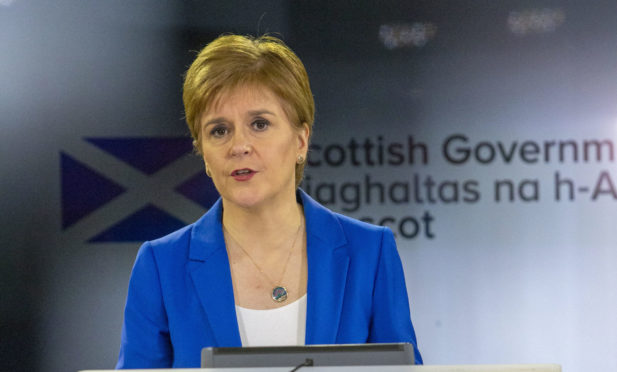Nicola Sturgeon has warned Boris Johnson’s reported changes to lockdown rules “would not be safe to make in Scotland”, as she formally extended restrictions for a further three weeks.
The first minister said it would be a “catastrophic mistake” to drop the stay at home message after it was suggested the UK Government could scrap the slogan as part of a range of measures expected to be announced on Sunday.
Ms Sturgeon said the Scottish Government may allow people to spend more time outdoors – in line with the prime minister’s reported plans for the UK – but warned she would not be “pressurised” into lifting restrictions prematurely.
Some reports have suggested more people could be encouraged to return to work when Mr Johnson reveals his plans in an address to the nation on Sunday night but Ms Sturgeon said any easing of measures would be “very, very risky” at this stage.
In a sign of increasing strains between the UK and Scottish governments, she also made clear her displeasure at learning about the prime minister’s potential plans through newspaper front pages.
The first minister appeared to row back on her previous statement that a draft version of the plan had been shared with the Scottish Government last weekend, and said the reported moves had not been discussed with devolved administrations.
Ms Sturgeon said her preference would be for all four nations to make changes together at the same pace but added “we can decide in an entirely grown-up way if we are at different stages and want to go different ways”.
“I’m very clear that I want four nations decision making but that has to be all four governments discussing and agreeing,” she said. “It cannot be one government deciding and the rest of us simply being expected to fall into line.
“I’m very clear that what I have read in the media today, at the stage we are at and with the evidence we have about the infection rate and the R number, those changes would not be safe to make in Scotland – with the one exception that I’ve spoken about already around outdoor exercise.”
At her daily briefing in Edinburgh, Ms Sturgeon announced a further 59 deaths from coronavirus in Scotland, taking the total to 1,762. She said 12,924 people have now tested positive for the virus, up by 215 from 12,709 the day before.
The number of people in intensive care saw a decrease of three from Wednesday, down to 86, while patients in intensive care dropped by 45 to 1,587.
The first minister said strict rules to limit activity would be extended because the Scottish Government’s assessment of the evidence “leads me to the conclusion that the lockdown must be extended at this stage”.
However, she said it was possible changes could be made before the next review date in three weeks’ time “if the evidence suggests it is safe to do so”.
“Extreme caution is required at this critical juncture to avoid a rapid resurgence of the virus,” Ms Sturgeon said.
“It is not an exaggeration to say decisions now are a matter of life and death.
“That is why they weigh so very, very heavily and why they must be taken with great care, and it is why as I take them I will continue to err on the side of caution.”
The first minister said it was Boris Johnson’s “right” to move at a faster pace for England but she must make judgements “informed by the evidence that are right and safe for Scotland”.
“The other possible changes that are reported in the media, such as encouraging more people back to work now, opening beer gardens, or encouraging more use of public transport, would not in my judgement be safe for us to make yet,” she said.
“What I do not want a few weeks from now is for us to see a resurgence of this virus, and for you to be asking me, ‘why on Earth did you start to ease lockdown a week or a couple of weeks too early?'”
Labour leader Keir Starmer has called on Mr Johnson to build a consensus with the Scottish Government and other devolved administrations while lifting restrictions.
Mr Starmer, who held virtual meetings with members of the public in Glasgow and Fife on Wednesday, said it was his “strong preference” decisions were taken across the UK as a whole, warning it would otherwise be difficult to police measures.
“It is very important that we build a national consensus about what happens next,” he said. “It does mean that the prime minister has got to involve the devolved nations, trade unions, civic society and opposition parties in a very meaningful way.”
